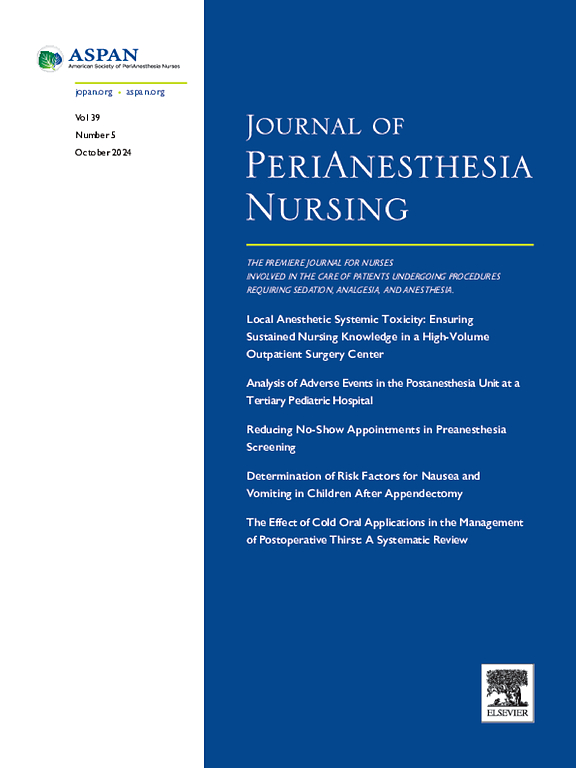经皮穴位电刺激对非心脏手术患者拔管相关应激反应的影响:随机对照试验的系统回顾和元分析》。
IF 1.6
4区 医学
Q2 NURSING
引用次数: 0
摘要
目的:应激反应是拔管过程中常见的并发症,主要表现为血流动力学的剧烈波动。经皮穴位电刺激(TEAS)被广泛应用于围手术期。我们进行了这项荟萃分析,以评估经皮穴位电刺激是否能缓解非心脏手术患者拔管时的应激反应:设计:对随机对照试验进行系统回顾和荟萃分析:我们检索了六个数据库(PubMed、Web of Science、Embase、Cochrane Library、China National Knowledge Infrastructure、CNKI 和 Wan Fang)中的相关文献。根据 Cochrane 标准进行了偏倚风险评估。我们使用RevMan5.4.1软件分析数据。当χ2检验未显示异质性时,我们采用固定效应模型。结果:本次荟萃分析共纳入了 12 项随机对照试验,共有 1 347 名参与者。荟萃分析表明,干预组在拔管后立即、5 分钟和 10 分钟的心率和平均动脉压均显著低于对照组。TEAS 组的急诊躁动(RR 0.39,95% CI [0.26,0.60])和术后谵妄(RR 0.40,95% CI [0.22,0.72])发生率也较低。与对照组相比,干预组的异丙酚用量(标准化平均差(SMD)0.47,95% CI [-0.77,-0.18])和瑞芬太尼用量(SMD 1.49,95% CI [-2.01,-0.96])也显著减少:TEAS有利于改善拔管时的应激反应、出现躁动、术后谵妄,并减少术中丙泊酚和瑞芬太尼的用量,但有必要注意目前证据的局限性。本文章由计算机程序翻译,如有差异,请以英文原文为准。
Effect of Transcutaneous Electrical Acupoint Stimulation on Extubation-Related Stress Response in Noncardiac Surgery Patients: A Systematic Review and Meta-Analysis of Randomized Controlled Trials
Purpose
Stress response is a common complication during extubation, mainly manifested by dramatic hemodynamic fluctuations. Transcutaneous electrical acupoint stimulation (TEAS) is widely applied in the perioperative period. We performed this meta-analysis to evaluate whether the TEAS could relieve the stress response during extubation in noncardiac surgery patients.
Design
A systematic review and meta-analysis of randomized controlled trials.
Methods
We searched six databases (PubMed, Web of Science, Embase, Cochrane Library, China National Knowledge Infrastructure, CNKI, and Wan Fang) for relevant literature. A risk of bias assessment was executed based on the Cochrane Criteria. We applied RevMan5.4.1 software to analyze data. When the χ2 test did not show heterogeneity, we adopted the fixed-effect model. Otherwise, the random-effect model was used.
Findings
ln total, 12 randomized controlled trials with 1,347 participants were enrolled in this meta-analysis. Meta-analysis showed the heart rate and mean arterial pressure of the intervention group were significantly lower than the control group at immediately, 5 minutes, and 10 minutes after extubation. The occurrence rate of emergency agitation (RR 0.39, 95% CI [0.26,0.60]) and postoperative delirium (RR 0.40, 95% CI [0.22, 0.72] were also lower in the TEAS group. The consumption of propofol (standardized mean difference (SMD) 0.47, 95% CI [−0.77, −0.18]) and remifentanil (SMD 1.49, 95% CI [−2.01, −0.96]) of the intervention group were also significantly reduced compared with the control group.
Conclusions
TEAS was beneficial for improving stress response during extubation, emergence agitation, postoperative delirium, and reduced the consumption of intraoperative propofol and remifentanil, but it was necessary to note the limitations of the current evidence.
求助全文
通过发布文献求助,成功后即可免费获取论文全文。
去求助
来源期刊

Journal of Perianesthesia Nursing
NURSING-
CiteScore
2.20
自引率
17.60%
发文量
279
审稿时长
90 days
期刊介绍:
The Journal of PeriAnesthesia Nursing provides original, peer-reviewed research for a primary audience that includes nurses in perianesthesia settings, including ambulatory surgery, preadmission testing, postanesthesia care (Phases I and II), extended observation, and pain management. The Journal provides a forum for sharing professional knowledge and experience relating to management, ethics, legislation, research, and other aspects of perianesthesia nursing.
 求助内容:
求助内容: 应助结果提醒方式:
应助结果提醒方式:


